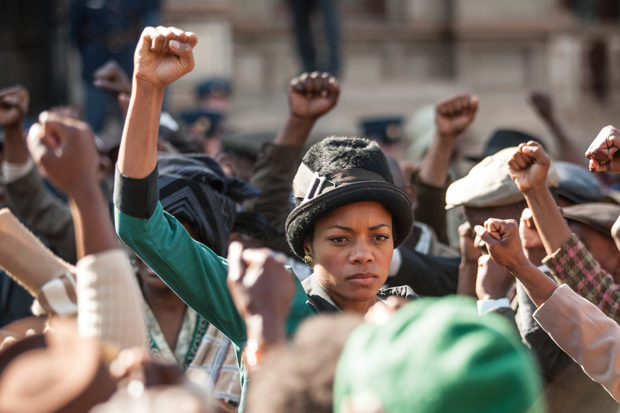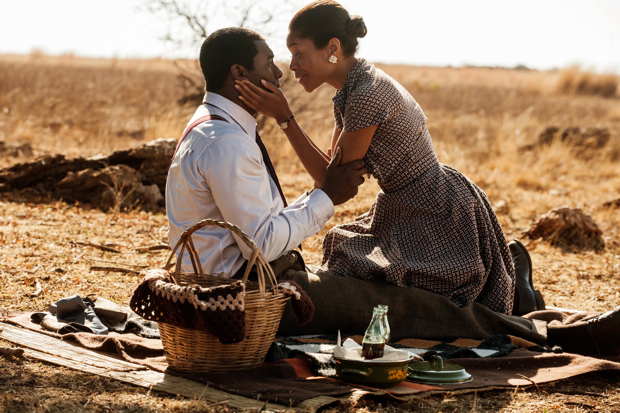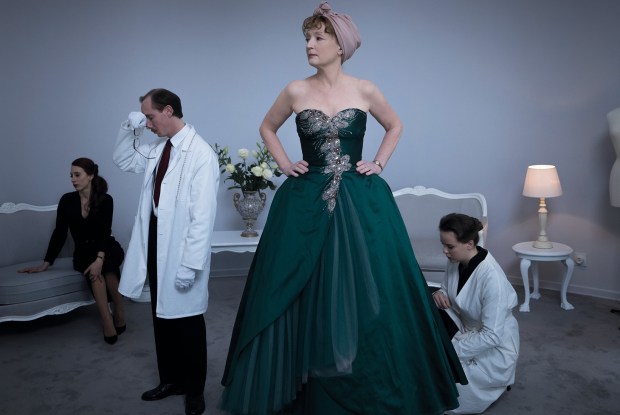How do you solve a problem like Winnie Madikizela-Mandela? Perhaps it wouldn’t have legs as a format for a BBC Saturday-night talent show, but it’s a question that Naomie Harris has been trying to answer ever since she agreed to play her in Mandela: Long Walk to Freedom.
I meet Harris at the Soho Hotel in London on the day before the UK première of the film, which tells the story of Nelson Mandela’s struggles against apartheid. It’s also, it transpires, the day before the death of the former South African president is announced to the world. Since his passing so much has been said about Mandela, but during the half-hour I spend with Harris it is his ex-wife who is uppermost in our minds.
She tells me, remarkably, that she knew next to nothing about the woman when she signed up to star in Long Walk to Freedom. Some hasty research later and the 37-year-old British actor was ‘terrified’, which is an understandable reaction given Madikizela-Mandela’s track record. She might well continue to enjoy popular support in South Africa, but she also has to her name a number of convictions for fraud and a conviction for kidnapping and assault in connection with the death of a 14-year-old boy.
Furthermore, the post-apartheid Truth and Reconciliation Commission found her to be ‘politically and morally accountable for the gross violations of human rights’ carried out by her team of bodyguards. Known as Mandela United Football Club, their torture method of choice, known as necklacing, involved hanging petrol-filled tyres around people’s necks and setting them alight.
Throughout our time together, Harris speaks intelligently and openly, but as far as the chequered history of Madikizela-Mandela is concerned, she picks her words very carefully. The last time she was on the promotional trail, it was to talk up the James Bond behemoth Skyfall, and she admits that discussing the ins and outs of playing Miss Moneypenny was a little simpler. In the past few months she’s been all over the world plugging Long Walk to Freedom and she’s learnt, she says, that playing a politician means sometimes having to answer like one.
‘It’s not down to me to justify [Winnie’s]actions because I’m not her spokesperson,’ she says, fairly. ‘But I do want to explain why this young girl becomes the woman she becomes. There are two main ways she is portrayed: as this Mother of Africa saint figure, and then there are those who demonise her and say she’s a fraudster and a murderer. What I wanted to do was create a character that combines both elements of her.’
Before filming started, the two women met for dinner, and it is clear from the way Harris talks about this meeting that she was, to some extent, charmed. She also proffers the argument that the behaviour of Madikizela-Mandela during and after the apartheid era has to be understood in the context of the treatment meted out to her by the South African authorities. At one point, as the film shows, she was held in solitary confinement for 18 months.
Yet it would be fair to say that neither Harris nor Long Walk to Freedom shies away from the dark side of this divisive woman. She says Madikizela-Mandela gave her the ‘freedom to tell her story truthfully’, and the way Harris’s performance charts the development of her character’s militancy is the most interesting aspect of what is, it must be said, a fairly underwhelming film.
Connecting with all of that darkness was something the actor struggled with. ‘Winnie is someone with a lot of anger and rage, and having rage, anger and hatred are things I try and steer away from in my personal life. I always say that there’s no one I hate,’ she tells me. ‘I feel karma gets around and deals with people so I don’t have to. That’s a very different way of approaching life that I have compared to her, so to inhabit that was my real challenge and was the toughest part of being in the film.’
When the topic of conversation moves on, Harris noticeably relaxes. She laughs often, including when I suggest that Idris Elba, of The Wire and Luther fame, makes for the hunkiest representation of Nelson Mandela we’re ever likely to see on screen. ‘Nelson was considered a hunk in his young days,’ she counters, before speaking glowingly of working alongside her co-star (‘I was lucky to go on this journey with him’).
Harris has been acting professionally since the age of nine, so it’s no surprise she occasionally slips into ‘luvvie’ mode, but, aside from that and her great beauty, she comes across as perfectly normal. Having starred in Skyfall, a couple of the Pirates of the Caribbean films and Long Walk to Freedom, she is now a bona fide Hollywood star, yet she stays out of the way of the paparazzi as best she can, avoids talking about her love life, and describes herself as a ‘homebody’ who loves nothing better than spending time with her mother and two teenage siblings, who live on the same north London street as her.
For someone who has been acting for so long and appears so outwardly confident, it comes as a surprise to hear that her appearance in the National Theatre’s production of Frankenstein a couple of years ago was a job she hated. Her nerves couldn’t stand it and she thought she’d be sick every night. ‘Never again,’ Harris says of treading the boards. Despite loathing the live experience, some good did come out of Frankenstein as Skyfall director Sam Mendes cast her after seeing it. Unsurprisingly, given that film’s mega-success, she is keen to have another go at Miss Moneypenny in the next 007 instalment.
As well as being in another Bond film, I wonder what else is coming up for Harris. Is there another real-life figure she’d be keen to portray? She thinks for a moment or two, but can’t come up with an answer. Instead she reflects that playing Winnie Madikizela-Mandela has been ‘more constricting’ than any other part she’s played in her career.
‘What I really love is playing people who are completely unconstrained by reality,’ she says. ‘With a fictional character you are liberated and free.’
Got something to add? Join the discussion and comment below.
Get 10 issues for just $10
Subscribe to The Spectator Australia today for the next 10 magazine issues, plus full online access, for just $10.
You might disagree with half of it, but you’ll enjoy reading all of it. Try your first month for free, then just $2 a week for the remainder of your first year.














Comments
Don't miss out
Join the conversation with other Spectator Australia readers. Subscribe to leave a comment.
SUBSCRIBEAlready a subscriber? Log in